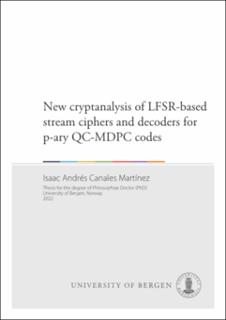New cryptanalysis of LFSR-based stream ciphers and decoders for p-ary QC-MDPC codes
Doctoral thesis

Åpne
Permanent lenke
https://hdl.handle.net/11250/2983504Utgivelsesdato
2022-03-18Metadata
Vis full innførselSamlinger
Sammendrag
The security of modern cryptography is based on the hardness of solving certain problems. In this context, a problem is considered hard if there is no known polynomial time algorithm to solve it. Initially, the security assessment of cryptographic systems only considered adversaries with classical computational resources, i.e., digital computers. It is now known that there exist polynomial-time quantum algorithms that would render certain cryptosystems insecure if large-scale quantum computers were available. Thus, adversaries with access to such computers should also be considered. In particular, cryptosystems based on the hardness of integer factorisation or the discrete logarithm problem would be broken. For some others such as symmetric-key cryptosystems, the impact seems not to be as serious; it is recommended to at least double the key size of currently used systems to preserve their security level. The potential threat posed by sufficiently powerful quantum computers motivates the continued study and development of post-quantum cryptography, that is, cryptographic systems that are secure against adversaries with access to quantum computations.
It is believed that symmetric-key cryptosystems should be secure from quantum attacks. In this manuscript, we study the security of one such family of systems; namely, stream ciphers. They are mainly used in applications where high throughput is required in software or low resource usage is required in hardware. Our focus is on the cryptanalysis of stream ciphers employing linear feedback shift registers (LFSRs). This is modelled as the problem of finding solutions to systems of linear equations with associated probability distributions on the set of right hand sides. To solve this problem, we first present a multivariate version of the correlation attack introduced by Siegenthaler. Building on the ideas of the multivariate attack, we propose a new cryptanalytic method with lower time complexity. Alongside this, we introduce the notion of relations modulo a matrix B, which may be seen as a generalisation of parity-checks used in fast correlation attacks. The latter are among the most important class of attacks against LFSR-based stream ciphers. Our new method is successfully applied to hard instances of the filter generator and requires a lower amount of keystream compared to other attacks in the literature. We also perform a theoretical attack against the Grain-v1 cipher and an experimental attack against a toy Grain-like cipher. Compared to the best previous attack, our technique requires less keystream bits but also has a higher time complexity. This is the result of joint work with Semaev.
Public-key cryptosystems based on error-correcting codes are also believed to be secure against quantum attacks. To this end, we develop a new technique in code-based cryptography. Specifically, we propose new decoders for quasi-cyclic moderate density parity-check (QC-MDPC) codes. These codes were proposed by Misoczki et al.\ for use in the McEliece scheme. The use of QC-MDPC codes avoids attacks applicable when using low-density parity-check (LDPC) codes and also allows for keys with short size. Although we focus on decoding for a particular instance of the p-ary QC-MDPC scheme, our new decoding algorithm is also a general decoding method for p-ary MDPC-like schemes. This algorithm is a bit-flipping decoder, and its performance is improved by varying thresholds for the different iterations. Experimental results demonstrate that our decoders enjoy a very low decoding failure rate for the chosen p-ary QC-MDPC instance. This is the result of joint work with Guo and Johansson.